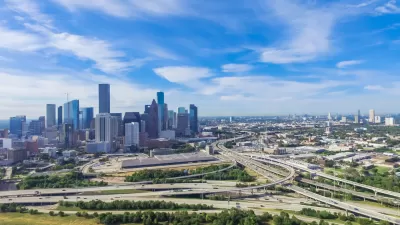Proposals for road diets, ‘15-minute cities,’ and other traffic reduction programs often meet with unfounded conspiracy theories claiming that the plans are nothing short of steps to world domination.

Pointing to an example from Oxford, England, The Guardian’s Peter Walker explores why conspiracy theorists are drawn to traffic calming plans, claiming there are more sinister reasons behind them.
According to the theories, promoted by far-right Canadian psychologist Jordan Peterson, among others, “Oxford’s traffic plan, they insist, is the first step in a global plot led by – depending on who you listen to – the World Economic Forum (WEF) or the UN, designed to strip people of their fundamental rights and personal possessions in the name of the environment.” Walker first debunks the claims. “It is worth stressing that no trip will be impossible, though some could be longer than before, with drivers instead having to use a less central route such as the city’s ring road.”
According to Walker, conspiracies connected to cars and traffic abound in part because “efforts to limit people’s right to drive, whether in previous years through residents’ parking zones, or more recently with low-traffic neighbourhoods, have often prompted a furious response, usually from a noisy minority.” These fears tie in with “climate conspirators,” who believe climate change is an elaborate scheme to bring the world under the control of an international cabal.
Why should we care about a small group of people believing absurd claims? “One significant worry is that people objecting to traffic restrictions can easily become exposed to much murkier ideas,” Walker explains.
FULL STORY: Why do traffic reduction schemes attract so many conspiracy theories?

Planetizen Federal Action Tracker
A weekly monitor of how Trump’s orders and actions are impacting planners and planning in America.

San Francisco's School District Spent $105M To Build Affordable Housing for Teachers — And That's Just the Beginning
SFUSD joins a growing list of school districts using their land holdings to address housing affordability challenges faced by their own employees.

The Tiny, Adorable $7,000 Car Turning Japan Onto EVs
The single seat Mibot charges from a regular plug as quickly as an iPad, and is about half the price of an average EV.

As Trump Phases Out FEMA, Is It Time to Flee the Floodplains?
With less federal funding available for disaster relief efforts, the need to relocate at-risk communities is more urgent than ever.

With Protected Lanes, 460% More People Commute by Bike
For those needing more ammo, more data proving what we already knew is here.

In More Metros Than You’d Think, Suburbs are Now More Expensive Than the City
If you're moving to the burbs to save on square footage, data shows you should think again.
Urban Design for Planners 1: Software Tools
This six-course series explores essential urban design concepts using open source software and equips planners with the tools they need to participate fully in the urban design process.
Planning for Universal Design
Learn the tools for implementing Universal Design in planning regulations.
Smith Gee Studio
City of Charlotte
City of Camden Redevelopment Agency
City of Astoria
Transportation Research & Education Center (TREC) at Portland State University
US High Speed Rail Association
City of Camden Redevelopment Agency
Municipality of Princeton (NJ)





























